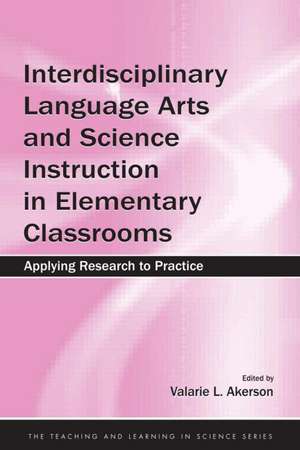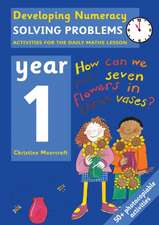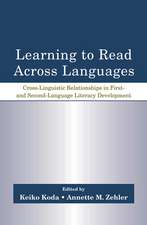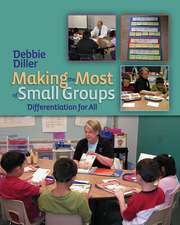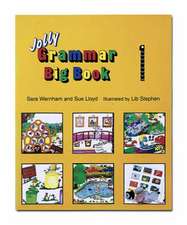Interdisciplinary Language Arts and Science Instruction in Elementary Classrooms: Applying Research to Practice
Editat de Valarie L. Akersonen Limba Engleză Paperback – 19 iul 2007
*Introduction to Interdisciplinary Science and Language Arts Instruction;
*The Influence of Interdisciplinary Science and Language Arts Instruction on Children’s Learning; and
*Research on Preparing Elementary Teachers to Use Interdisciplinary Science and Language Arts Instruction
Each chapter summarizes the research on its focal topic. Examples of research applied to practice, and questions and prompts for discussion and reflection help readers apply what they are reading in their own classroom contexts. Teacher educators and prospective and practicing elementary teachers everywhere will benefit from this overview of current research and practice in interdisciplinary science and language arts instruction.
| Toate formatele și edițiile | Preț | Express |
|---|---|---|
| Paperback (1) | 449.18 lei 6-8 săpt. | |
| Taylor & Francis – 19 iul 2007 | 449.18 lei 6-8 săpt. | |
| Hardback (1) | 1005.04 lei 6-8 săpt. | |
| Taylor & Francis – 19 iul 2007 | 1005.04 lei 6-8 săpt. |
Preț: 449.18 lei
Nou
Puncte Express: 674
Preț estimativ în valută:
85.96€ • 88.80$ • 71.54£
85.96€ • 88.80$ • 71.54£
Carte tipărită la comandă
Livrare economică 26 martie-09 aprilie
Preluare comenzi: 021 569.72.76
Specificații
ISBN-13: 9780805860030
ISBN-10: 0805860037
Pagini: 336
Ilustrații: 28 b/w images and 3 tables
Dimensiuni: 152 x 229 x 18 mm
Greutate: 0.61 kg
Ediția:1
Editura: Taylor & Francis
Colecția Routledge
Locul publicării:Oxford, United Kingdom
ISBN-10: 0805860037
Pagini: 336
Ilustrații: 28 b/w images and 3 tables
Dimensiuni: 152 x 229 x 18 mm
Greutate: 0.61 kg
Ediția:1
Editura: Taylor & Francis
Colecția Routledge
Locul publicării:Oxford, United Kingdom
Cuprins
Contents: Preface. Part I: Introduction to Interdisciplinary Science and Language Arts Instruction. V.L. Akerson, T.A. Young, Why Interdisciplinary Language Arts and Science Instruction? J.C. Richards, Interdisciplinary Teaching: History, Theory, and Interpretations. T.D. Sadler, Sociocultural Perspective on Scientific Literacy and Learning Science. Part II: The Influence of Interdisciplinary Science and Language Arts Instruction on Children's Learning. J.A. Morrison, Teachers’ Use of Science Notebooks to Assess Understanding of Science Concepts. D.T. Crowther, J.R. Cannon, Using the THC Model of Science Investigation and Science Notebooking in Elementary and Middle-Level Science Classrooms. D.A. Powell, R.J. Aram, Children Publish in Science as a Way of Knowing. D. Crowther, M. Robinson, A. Edmundson, A. Colburn, Preparing English Language Learners in the Science Classroom. C. Gile, Inquiry Curriculum in the Primary Grades. Part III: Research on Preparing Elementary Teachers to Use Interdisciplinary Science and Language Arts Instruction. W.P. Bintz, S. Moore, Using a Literature-Based Text Cluster to Teach Science. J.C. Richards, K.T. Shea, Interdisciplinary Teaching in the Primary Grades: Preservice Teachers’ Dilemmas and Achievements Connecting Science, the Arts, and Reading. J.A. Morrison, Using Science Notebook Writing to Promote Preservice Teachers’ Understanding of Formative Assessment. I. Graves, T. Phillipson, Using Critical Literacy in the Science Classroom. S.J. Britsch, D.P. Shepardson, CLASP: An Approach to Helping Teachers Interpret Children’s Science Journaling. L.Y. Lu, Semiotics for Integrating Geosciences Into Literacy in Teacher Education. V.L. Akerson, Using Action Research Projects to Help Preservice Elementary Teachers Effectively Use Interdisciplinary Language Arts and Science Instruction. Part IV: Conclusions and Recommendations. V.L. Akerson, T.A. Young, What Do We Know From Our Research? What Do We Still Need to Know? Conclusions and Recommendations.
Descriere
This volume brings together evidence-based approaches to interdisciplinary language arts and science instruction. Firmly grounded in the research showing cognitive parallels between the two subjects, and reflecting the many recommendations in recent years for using interdisciplinary instruction at the elementary level, its goal is to help teachers
